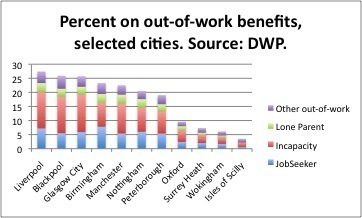IDS has played the party politics of welfare reform adeptly. He has built a coalition beyond the government, convinced of the need for urgency and dynamic reform. Even Labour is on side, only criticising when valid and necessary. It has not proposed a comprehensive alternative because it is protecting its record in government – sensing, correctly, that it is vulnerable to its history. Douglas Alexander rallies to New Labour’s defence in the Independent on Sunday.
Labour’s record on welfare was not uniformly baleful: Purnell, Hutton and Murphy did important work, on which IDS has drawn. But Alexander overlooks some inconvenient truths. Gordon Brown’s definition of ‘poverty’ was an arbitrary line beneath 60 percent of national income – all policy was geared to lifting those just below the line above it; those right at the bottom were neglected. So, the poorest 10 percent were worse off at the end of decade (£87/week) than they were at its beginning (£98/week).
The proceeds of growth were not shared: whilst London boomed, Moss Side rotted. At no point in the last decade did the jobless totals in Glasgow, Liverpool, Hartlepool, Middlesbrough, Rochdale and Abedare fall beneath 20 percent of working age population.

While employment rose over the course of 10 years, 5 million Britons remained on some variety of out of work benefit because private sector vacancies were mainly filled by short-term migrant workers.

Starved of opportunity, worklessness becomes inherited. 1.9 million children grow up in workless households, and staggering numbers of Pakistani and Bangladeshi immigrants have been unemployed for generations. This is a long-term problem, a failure of successive governments and the social ills (literally in this case) of worklessness are plain for all to see.







Comments